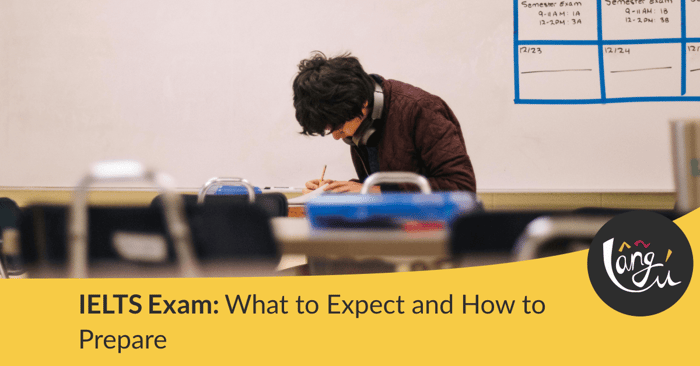If you're planning to study, work, or live in an English-speaking country, chances are you'll need to take the IELTS exam. This internationally recognized test measures your English proficiency in four core areas: listening, reading, writing, and speaking. Whether you’re aiming for academic admission or immigration purposes, scoring well on the IELTS exam can open doors. But to succeed, you need more than just basic English skills — you need a clear strategy and targeted preparation.
Here’s a detailed breakdown of what to expect and how to prepare effectively.
What Is the IELTS Exam?
The IELTS exam (International English Language Testing System) is a standardized test designed to assess the English language abilities of non-native speakers. There are two types:
IELTS Academic: for those applying for higher education or professional registration.
IELTS General Training: for those migrating to an English-speaking country or applying for training programs and secondary education.
Both versions test the same four skills, but the content of the reading and writing sections differs.
Test Format and Timing
The IELTS exam consists of four sections, completed in the following order:
1. Listening (30 minutes + 10 minutes transfer time)
You’ll listen to four recordings: a conversation, a monologue in a social context, an educational lecture, and a more complex discussion. Each section tests your ability to understand main ideas, opinions, and detailed factual information.
2. Reading (60 minutes)
Academic: Three long texts taken from books, journals, or newspapers.
General Training: Extracts from advertisements, manuals, or workplace documents.
You’ll answer 40 questions designed to assess reading for gist, detail, logical argument, and recognizing the writer’s purpose.
3. Writing (60 minutes)
Academic: Task 1 involves describing visual data (charts, graphs); Task 2 is an essay responding to a point of view or problem.
General Training: Task 1 asks you to write a letter; Task 2 is also an essay, but typically on a more everyday topic.
Clarity, coherence, grammar, and vocabulary are all assessed.
4. Speaking (11–14 minutes)
This part is a live interview with an examiner. It includes:
A general introduction and short questions.
A longer monologue based on a topic card (1-minute prep + 2-minute speaking).
A discussion related to the monologue topic.
The Speaking test may be on the same day or up to a week before or after the other sections.
How the IELTS Exam Is Scored
Each skill is scored on a band scale from 1 to 9. The four scores are averaged to produce your overall band score. Most universities require a minimum of 6.5 or 7, but requirements vary depending on the institution or visa policy.
Band Descriptors assess:
Fluency and coherence
Lexical resource
Grammatical range and accuracy
Pronunciation (for speaking)
So it's not just what you say or write, but how you say or write it that matters.
Common Challenges
Students often underestimate:
Time pressure: Many fail to finish all questions, especially in reading and writing.
Vocabulary range: Repeating the same words lowers your score.
Accent clarity: In speaking, pronunciation and intonation can affect comprehension.
Understanding British spelling and idioms: These often appear in reading texts or listening sections.
How to Prepare for the IELTS Exam
Preparation should be focused, strategic, and consistent. Here’s how to build your plan.
1. Know Your Target Score
Before anything else, check the score requirements of the institution or country you’re applying to. Your preparation strategy should align with that goal.
2. Take a Diagnostic Test
Start by taking a full-length IELTS exam under timed conditions. This reveals your strengths and weaknesses so you don’t waste time on areas you’ve already mastered.
3. Use Official Materials
Stick to resources from Cambridge, the British Council, and IDP — the organizations behind the test. Their sample tests reflect the actual difficulty level and question types.
4. Practice Each Section Specifically
Listening: Train with real recordings, not just classroom exercises. Get used to different English accents (British, Australian, Canadian, etc.).
Reading: Practice scanning and skimming. Learn to identify keywords and match them to questions quickly.
Writing: Memorize templates but avoid being robotic. Practice under time pressure, and get your writing checked by a teacher.
Speaking: Record yourself and analyze fluency, grammar, and pronunciation. Practice answering both expected and unpredictable questions.
5. Simulate Real Test Conditions
Test-day nerves can hurt your performance. Take full mock exams regularly — timed, uninterrupted, and with distractions minimized — to build stamina and focus.
6. Get Feedback from a Professional
No app or book can point out every mistake you make. A professional English teacher can highlight specific issues in your grammar, pronunciation, and writing structure. This personalized feedback can dramatically improve your score.
Final Tips for IELTS Success
Don’t cram vocabulary; use new words in sentences to remember them better.
Improve general English, not just test-specific skills.
Stay updated with world events — they help in writing and speaking topics.
Learn from your mistakes. Review every mock test to see where you lost points.
Stay calm. Time management and stress control are as important as language skills.
Conclusion: Don’t Do It Alone
The IELTS exam is not just a test of English — it’s a test of strategy, timing, and precision. It can determine whether you qualify for your dream university or visa. So don’t leave it to chance.
The most effective way to prepare is to study with a professional English teacher who understands the test inside out. At Langu, you can book one-on-one lessons with experienced IELTS instructors who tailor their teaching to your unique goals and challenges. Whether you need help boosting your writing score or building fluency for the speaking section, HeyLangu makes it easy to connect with the right expert.
Start your IELTS preparation the smart way — book your first lesson today at Langu.
Find your perfect IELTS teacher
FAQs
What is the IELTS exam and who needs to take it?
The IELTS exam (International English Language Testing System) is a standardized English test for non-native speakers. It’s required by universities, employers, and immigration authorities in many English-speaking countries. You may need to take the IELTS exam if you're applying to study abroad, work internationally, or move to countries like the UK, Canada, or Australia.
How can I effectively prepare for the IELTS exam at home?
To prepare for the IELTS exam at home, start with a practice test to assess your level. Use official IELTS materials to study each section—listening, reading, writing, and speaking. Focus on time management, build your vocabulary, and practice writing essays. For faster progress, take online lessons with a qualified teacher who can give you personalized feedback.
What score do I need to pass the IELTS exam for university or immigration?
There’s no universal passing score for the IELTS exam. Most universities require a score between 6.0 and 7.5, depending on the program. For immigration, the required score depends on the country and visa type. Always check the specific requirements of the institution or immigration authority you're applying to.




